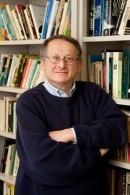
Professor Barry Checkoway recently reflected on why he came to the School of Social Work. “I was teaching urban planning at the University of Illinois at Urbana-Champaign — just as I had at the University of California at Berkeley. I was deeply engaged in community projects in Chicago and St. Louis, when Harold Johnson, then dean of the School of Social Work, called and invited me to come and interview for a job. I remember saying that I was not a social worker and had never even taken a course in social work, and his response was ‘perfect that's the kind of person we want for this for this job’ and he was very convincing.
“I knew that Michigan had a reputation for excellence, and was located near Detroit. I had always worked closely with community partners and thought that Detroit — as the most racially segregated and economically disinvested city in the U.S. — offered special opportunities for my work.
“When I came for the interview and met a few prospective colleagues, I felt like this would be a good fit. We picked up our family, moved to Ann Arbor and never regretted the decision. The dean asked me to develop the community organization area of the curriculum, and that’s what I have done. He asked me to establish partnerships in Detroit, revise the curriculum, and recruit students. We grew the program from only five students to more than 100 students.”Checkoway has recently retired and said “I hope that I will be thought of as one of the people who built and sustained a curriculum based on community organization and community change in the school of social work.”
Checkoway is the Arthur Duhnamn Collegiate Professor of Social Work and holds an additional appointment as a Professor of Urban Planning at U-M’s Taubman College of Architecture and Urban Planning. Checkoway’s career highlights include working with the White House in 1990 to launch AmericaCorps, the national service program. Checkoway developed the protocols enabling students to participate while still in college or graduate school. He also launched and directed the Michigan Neighborhood AmeriCorps Program, which enabled students from five graduate programs to work with 20 neighborhood organizations in Detroit.
Checkoway is also the founding director Youth Dialogues on Race and Ethnicity — a continuing project that brings together high school students from highly segregated communities across Metro Detroit. In addition to the dialogues, the program has generated a yearly policy summit on civil rights and social justice education, leadership retreats for young people on the U-M campus and the Youth Civil Rights Academy. “One of my big regrets about the pandemic is that it just stopped a lot of the work we’ve been doing with neighborhood groups.”
Upon his retirement, Checkoway asked that the School organize a symposium on youth empowerment and community change, as part of the school’s centennial celebration, instead of the usual retirement party. “My hope is to strengthen our capacity to offer the best community curriculum, rather than to recount the number of articles or books that I have published. “The symposium will focus on the work we do — not just me, but some of my closest colleagues — and we’ll talk about new strategies. I’ll be happy to mark this occasion with such a nourishing activity on an important topic,” says Checkoway.
As for retirement, Checkoway sees it more as a new phase in his ongoing career rather than as a change in direction. “I am going on into the next stage in a career that started before I came into the academic world. I was a community worker before I came into higher education, I have been a community worker during the course of my professional work in higher education, and I will continue to be a community worker. The way I view it is, frankly, I’ll have more flexibility and spend more time working in local communities, rather than attending meetings and serving on committees.”